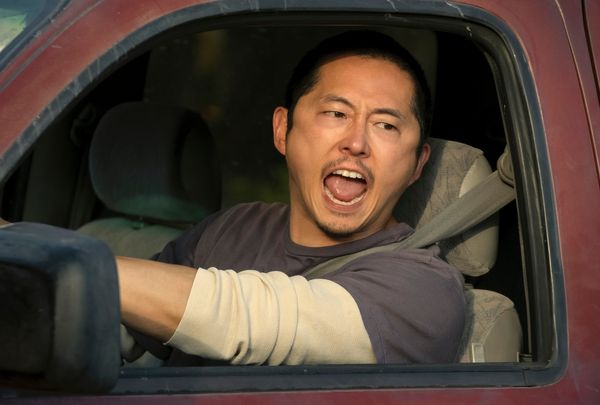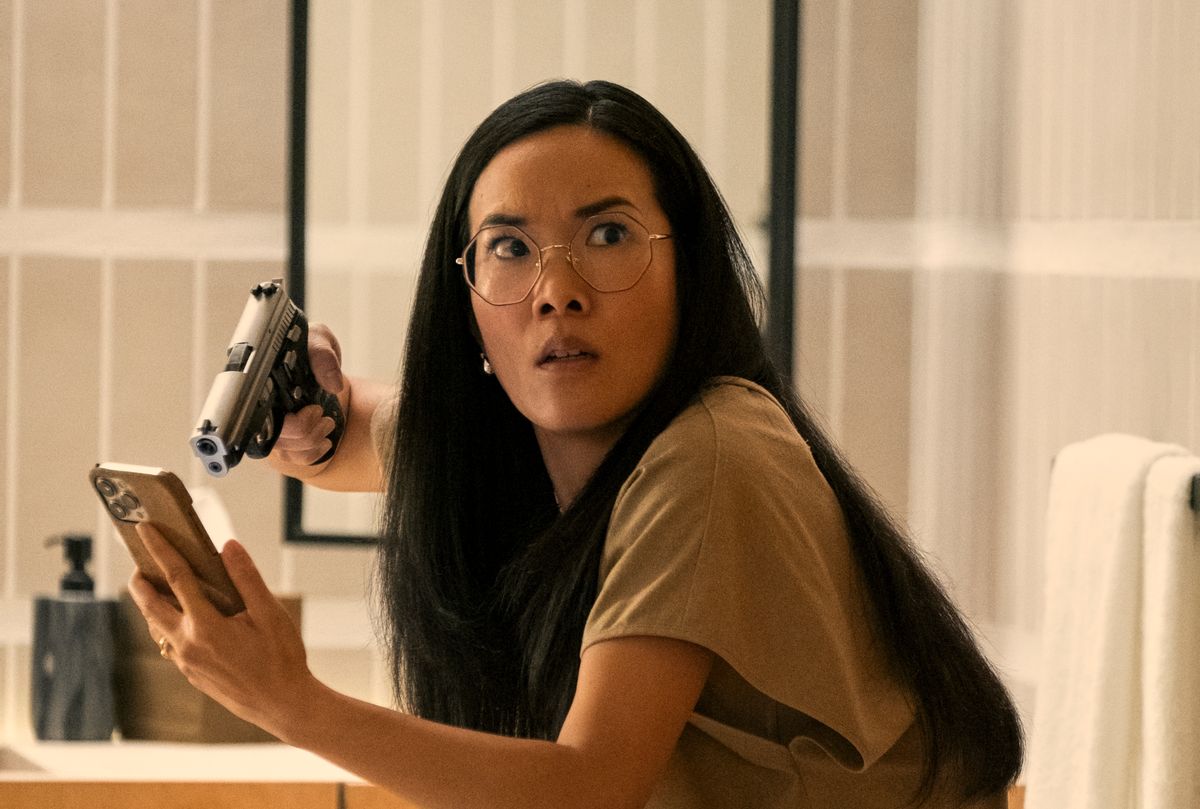One day in the future academics may view "Beef" as a convincing TV distillation of the early 21st-century's collective mood, a lingering and worsening state of society-wide pandemic anger. Hyperbolic? Maybe. But I challenge you to find another series that channels the spectrum of fury as wildly, beautifully and crazily while, for the most part, maintaining its focal clarity.
"Beef" begins with an eruption in a hardware store parking lot when in the middle of a day that isn't going his way, Danny Cho (Steven Yeun) nearly backs his shabby truck into Amy Lau (Ali Wong). She reacts by laying on her horn and blocking his way with her luxury mini-SUV.
Danny is a contractor who can't seem to turn his luck around and is at the end of his tether. Amy's problems are the opposite – she's a successful plant influencer and entrepreneur on the verge of selling her business for millions. She's also buckling under the pressure of closing that deal and sustaining her enterprise singlehandedly. God forbid she shows outward signs of being at her breaking point. That would damage her cultivated illusion that she is a serene, polished success who proves that women can have it all.
That brings us back to that parking lot and Amy stalling at Danny's rear bumper just to prove a point. Then after driving a few feet, she flips him off. He sees red and gives chase, driving through oncoming traffic and mauling someone's flowerbeds. Once she outmaneuvers him, Amy drives off. Not before Danny gets her license plate number.
So commences a long enmity that kicks off with sophomoric if brazen tit-for-tats and steadily metastasizes over weeks and months, crossing state lines and heating into a feud that pulls their families into its chaotic vortex. Appropriate to the speed at which Danny's and Amy's states flare from steady to forehead vein-popping Armageddon, "Beef" episodes are violently short, lasting around half an hour apiece.
"Beef" empathizes with its antagonists without condoning what they're doing to each other.
The tricky proposition of a show like this is striking an even keel in terms of explaining its characters' anger but refraining from either justifying it or wallowing in the psychological mire that caused it. In the same way that few of us want to be reminded of the low-level despair that's had us in its grip for the last three (or is it seven?) years, the notion of watching two strangers freak out at one another for five grinding hours has little appeal.
But this is where "Beef" proves its worth as an apt artistic conduit, processing our culture's low-grade, constant negativity into something bizarre and hysterical. Creator Lee Sung Jin and his writers empathize with their antagonists without condoning what they're doing to each other and everyone unlucky enough to be caught downwind of their acrimony.
Danny's and Amy's road rage is a symptom of other stressors in their lives; that much is plain and probably easier to see on Danny's side of the street. He shares a shabby apartment with his younger brother Paul (Young Mazino) who doesn't work. Danny can barely keep his business afloat, securing odd jobs where he can.
But Danny made a promise to buy his parents a home, which they keep reminding him is taking far too long. Amy, on the other hand, has a tastefully designed modernist lair in a nice part of town that she paid with by working so constantly that she never sees her daughter. Her husband George (Joseph Lee) is the son of a famous artist, something her mother-in-law Fumi (Patti Yasutake) loves reminding Amy of while casting disapproving glares in her direction.
Wong excels at showing all of that in Amy's intense, too-cheerful smile. The contrast the actor creates between her wild and sharply artificial gaze and her grin transforms her teeth into bleached gravestones, especially when that faux glee bursts forth right after she's exploded at a fresh slight.
 Steven Yeun in "Beef" (Andrew Cooper/Netflix)Yeun's performed madness is a coiled snake to Wong's wolverine; he grants Danny a slower burn that detonates after his frustration has dried up. Maybe that's because we're accustomed to him infusing a deep sadness in his performances as opposed to the rocket-fueled mania we see here.
Steven Yeun in "Beef" (Andrew Cooper/Netflix)Yeun's performed madness is a coiled snake to Wong's wolverine; he grants Danny a slower burn that detonates after his frustration has dried up. Maybe that's because we're accustomed to him infusing a deep sadness in his performances as opposed to the rocket-fueled mania we see here.
Whatever it is, he allows us to feel Danny's exhilaration in his spite. "Sometimes rock bottom is your trampoline!" he triumphantly tells Paul following a morsel of payback he thinks is enough to close the book on this quarrel. But that puffed-up confidence only makes the valley steeper and more extreme to navigate.
"Beef" is not pure comedy even if its leads and co-stars like David Choe, who plays Danny's criminally minded cousin Isaac, play it that way for much of its run. Rage has many sides, most of which are relatives to sorrow, and the script shows an understanding of that, ennobling Danny and Amy's stories with substance and grace even as the extent of their wrongdoing intensifies.
That makes the story a thoughtful study of the ways stifled emotions slowly poison us, whether that repression is a generational inheritance or a foolhardy choice. Lee's George represents that second idea, creating a curious contrast between him and Danny. George is a stay-at-home dad and unconditionally supportive of his wife, and he refuses to indulge his ire.
Want a daily wrap-up of all the news and commentary Salon has to offer? Subscribe to our morning newsletter, Crash Course.
"Anger is just a transitory state of consciousness," George says assuredly, explaining why he can calmly clean up one of Danny's first calling cards. But to Amy that makes him look like a soft boi with an Oedipus complex instead of "the better man."
No matter how good we have it, misfortune always rolls downhill with the rest of the feces.
Lee and his writers aren't content to impugn people like George or its other privileged figures because of their station; Amy isn't a villain because she's rich any more than Danny is bad for struggling, failing and eventually committing immoral acts to live up to the heavy expectations on his shoulders.
And there are people in their world who never lose their temper because they can have anything they want. Maria Bello is stupendous as Jordan, a woman with enough wealth to not care about anything or anyone's feelings. Amy is rich, but not Jordan rich, reminding us that no matter how good we have it, misfortune always rolls downhill with the rest of the feces.
Although Lee and the writers ably use the episodic format to mimic the ways chronic wrath escalates, "Beef" gets messy at the end, testing the credibility of the extremes to which animosity can drive a person. It contorts its way back to its sense via the warmth Yeun and Wong surface in passages whether their characters collapse into their frailty and exhaustion, but not without mangling some of the goodwill those scenes engender in the process.
This only happens long after the opening joke has fermented past intoxication to something sour, bitter yet stubbornly delectable, an imperfect yet satisfying dish of panger and worth enduring the burn.
"Beef" is currently streaming on Netflix.



Shares